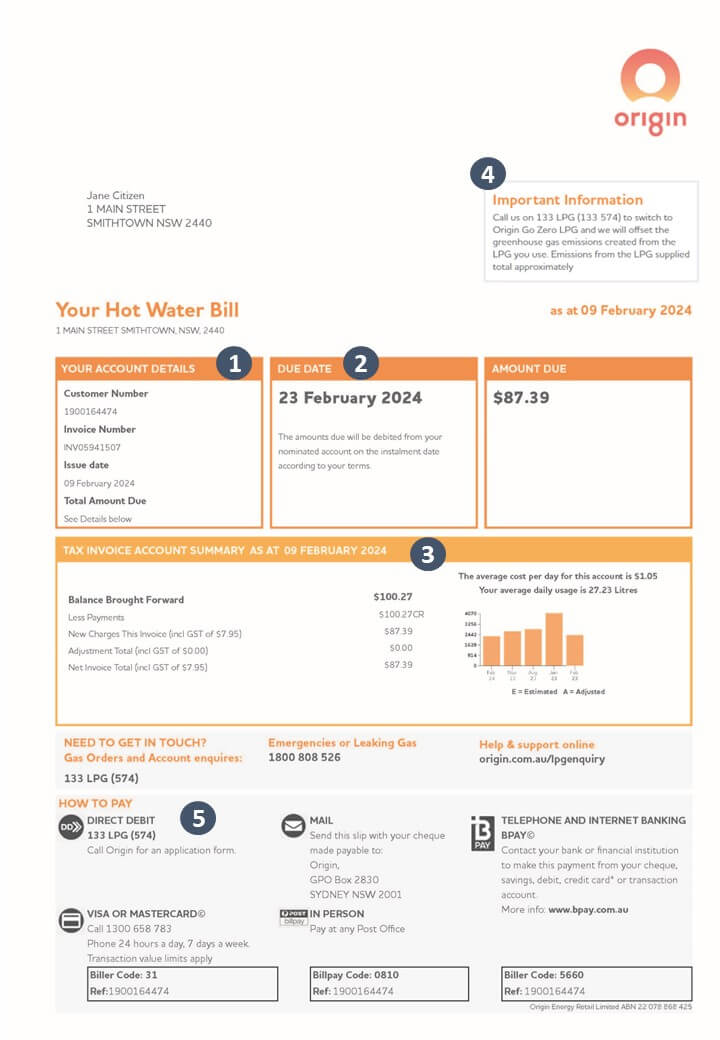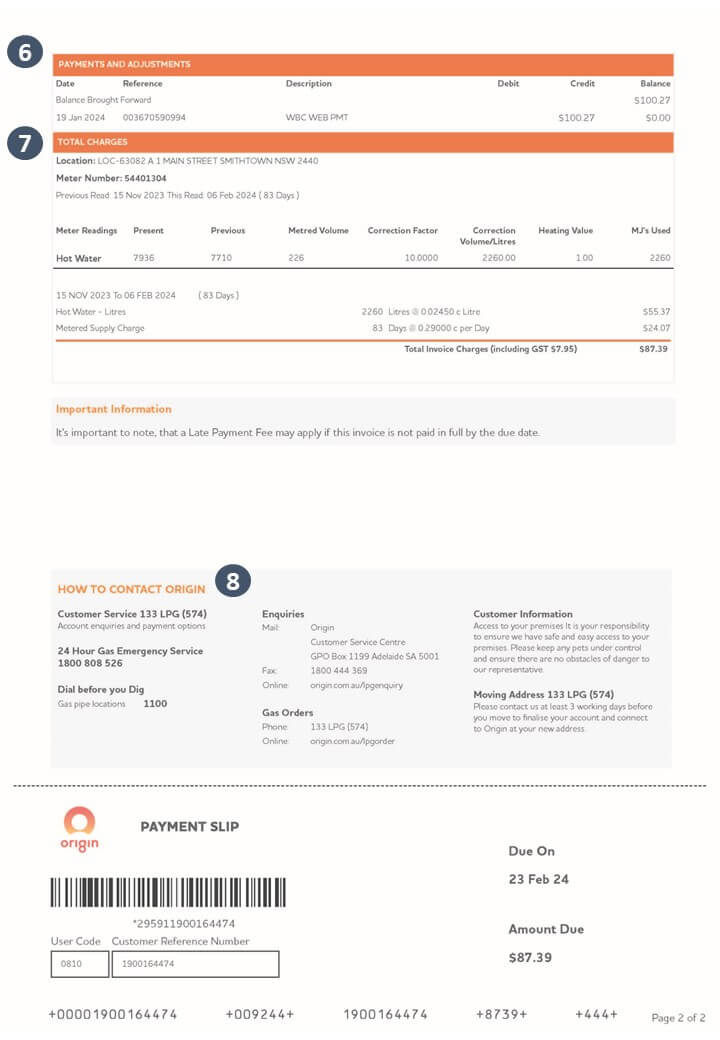Origin hot water bills explained

Key points.
- In addition to selling electricity, gas, LPG and solar, Origin Energy also provides hot water services for multi-tenant residences and complexes, such as apartment buildings.
- If you live in an apartment complex with a shared hot water system, you cannot choose your preferred hot water provider unless you move out.
- Your Origin hot water bill may be higher due to factors such as increased usage, rising supply and usage charges and an estimated meter reading.
If you live in an apartment complex, it’s likely that you have ‘centralised’ or ‘bulk’ hot water. The building’s body corporate or management will typically select the supplier and in many cases, this is Origin – one of Australia’s largest energy retailers.
Read on to learn all you need to know about Origin Energy’s hot water service and billing system. We also dissect an Origin hot water bill to highlight the key parts that you should be aware of.
On this page:
What is bulk hot water?
Bulk hot water is an arrangement whereby residents in a multi-tenant complex share one large hot water system. The body corporate is in charge of finding a bulk hot water supplier, and this bulk provider is in charge of hot water maintenance, meter monitoring and customer billing. Each residence has its own hot water meter, meaning customers are only billed for their own water usage – not the usage of their neighbours.
Origin is one of the largest bulk hot water suppliers in Australia.
Origin Energy hot water services
Origin Energy offers a range of hot water services for houses, townhouses, units and apartments. As mentioned, Origin Energy is responsible for reading apartment customers’ water meters and issuing their bill – usually once every three months.
Your hot water bill is separate to your electricity or natural gas bill. However, those bills do not factor in the energy it costs to heat up your water so as to ensure you’re not double-charged.
Although Origin Energy previously sold and installed hot water systems, this service is currently unavailable to customers.
Origin hot water bills explained
If you have never lived in an apartment before hot water bills might seem to be foreign. Fortunately, Origin Energy bills are pretty straightforward once you understand what to look for. Below we have a sample Origin hot water bill from an apartment resident. Underneath the image is an explanation of the bill corresponding with each of the numbered components.

1. Account details: This section contains your customer number, invoice number, issue date and total amount due.
2. Due date: The date the payment is due. In the case of a direct debit, your account will be billed on this day.
3. Tax invoice account summary: A summation of the net invoice total or the amount due. This features the balance brought forward, less payments, any new charges and any other adjustments since your previous bill.
4. Important information: This notice relates to your account or invoice.
5. How to pay: Various payment options, featuring instructions, codes and additional fees that may apply.

6. Payments and adjustments: Displays any payment or credit applied to your account since the last invoice.
7. Total charges: A summation of the period’s meter read information and the location. This section features the present reading, the previous reading, the metered volume, a correction factor, correction volume, as well as the supply rate per litre and any metered supply charge.
8. Origin contact: Details to contact Origin Energy.
Can I switch bulk hot water providers?
No, it is generally the case that you are unable to switch hot water providers if you live in an apartment. As you share your hot water system with other residents, it is up to the body corporate to select a bulk hot water provider.
If you have an issue with Origin or another hot water supplier, be sure to raise it with your body corporate and they may be able to assist you.
Origin hot water prices
Most centralised hot water systems use natural gas. Natural gas hot water systems are generally much cheaper to run than their electric counterparts, costing customers only a few cents per megajoule of gas.
In addition to usage costs, hot water customers are also billed a ‘supply charge’, which is a daily fixed fee that is designed to reflect the cost of transporting the gas to your property for water heating. The exact rates you pay will vary depending on your location and the deal that your building manager is able to strike with Origin.
Compare natural gas prices
Here are some of the cheapest gas deals on our database for NSW. These estimated annual costs are based on the Jemena Gas Network in Sydney and yearly gas usage of 18,800 MJ/year, but prices will vary depending on your own circumstances. The products are listed in order of lowest estimated price/year (including conditional discounts), then by the highest value rank (out of 10), then by highest brand satisfaction rating. These are products from referral partners†. Our database may not cover all deals in your area, and please check retailer websites for up to date information.
Advertiser Disclosure
Canstar Blue may earn a fee from its Online Partners for referrals from its website tables, and from sponsorship or promotion of certain products. Fees payable by product providers for referrals and sponsorship or promotion may vary between providers, website position, and revenue model. Sponsorship/promotion fees may be higher than referral fees. If a product is sponsored or promoted, it is an ad and it is clearly marked as such. An ad might appear in different places on our website, such as in comparison tables and articles. Ads may be displayed in a fixed position in a table, regardless of the product’s rating, price or other attributes. The location of an ad doesn’t indicate any ranking or rating by Canstar Blue. Payment of fees for ads does not influence Value Rank or Customer Satisfaction Ratings. See How We Get Paid to find out more.
General Disclosure – Energy
The data in the table is updated within 24 hours of Canstar Blue becoming aware of a change. You can find a description of the initial sort order below the table. You can use the sort buttons at the top of each column to re-order the display. Learn more about our Gas Value Rank Methodology.
Please note that the Satisfaction Rating displayed in the table is a rating relating to customers’ overall satisfaction with the brand. It should not be confused with an individual product rating. Learn more about Brand Satisfaction ratings and for more information on how the Brand Satisfaction ratings are calculated, read the Canstar Blue Most Satisfied Customers Methodology.
The results do not include all energy retailers or products in the market and may not compare all features relevant to you. Canstar Blue does not supply electricity or gas services. If you decide to apply for a particular energy product, you will deal directly with the retailer, not with Canstar Blue. Fees, charges, product information and contract terms should be confirmed directly with the relevant retailer.
Some plans may require you to meet certain conditions before a discount may become available to you. Check the energy provider’s plan information for details of all possible discounts that may apply and any conditions that need to be met for you to be eligible for these discounts.
Check your current plan’s exit fees and other termination provisions before changing providers.
Some plans may have a minimum term that is longer than one year. In that case the total cost over the term will be much higher than the estimated Price, which is for one year only. Consider the provider’s detailed product and pricing information before making a decision to take out a new plan or switch electricity providers.
Pricing Information
The price shown is inclusive of GST and is the estimated lowest possible price a representative customer would be charged in a year for each plan, assuming all conditions of discounts offered, if any, have been met. Gas usage assumptions have been derived from the average usages advertised by a selection of retailers in the distribution region as shown at the top of the table.
The general usage assumptions for products displayed in the table have been derived from:
- the average usages advertised by a selection of retailers in the distribution region as shown at the top of the table. The figures provided are intended to serve as general estimates and should be used for information only. If the amount of gas you actually use differs greatly from this estimate, your bill could be significantly larger or smaller than the estimated price/year listed for each plan; or
- if you have provided usage data from your gas bill, the estimated annual amount payable for this plan is based on your individual circumstances.
The estimated yearly Price is based on single rate tariffs, which is when a flat usage rate is charged for ‘blocks’ of gas consumed and could be a limited amount per day, month, quarter, which may include a second block with a different usage rate applied, or, season.
Some plans may have a minimum term longer than one year – in that case the total cost over the term will be much higher than the estimated yearly Price (which is only for one year).
Some plans may apply additional charges to the price shown. Always check the energy provider’s plan information for details of all charges that may apply.
What does the ‘phone’ mean?
By clicking on the number next to the phone icon, you will leave the Canstar Blue website and be connected with the call centre of the Online Partner’s brand that you have selected. You will be subject to that referral partner’s brand privacy policy and terms of use. You agree that Canstar Blue Referral Terms apply to this referral.
Here are some of the cheapest gas deals on our database for VIC. These estimated annual costs are based on the AGN – VIC network in Melbourne and yearly gas usage of 40,500 MJ/year, but prices will vary depending on your own circumstances. The products are listed in order of lowest estimated price/year (including conditional discounts), then by the highest value rank (out of 10), then by highest brand satisfaction rating. These are products from referral partners†. Our database may not cover all deals in your area, and please check retailer websites for up to date information.
Advertiser Disclosure
Canstar Blue may earn a fee from its Online Partners for referrals from its website tables, and from sponsorship or promotion of certain products. Fees payable by product providers for referrals and sponsorship or promotion may vary between providers, website position, and revenue model. Sponsorship/promotion fees may be higher than referral fees. If a product is sponsored or promoted, it is an ad and it is clearly marked as such. An ad might appear in different places on our website, such as in comparison tables and articles. Ads may be displayed in a fixed position in a table, regardless of the product’s rating, price or other attributes. The location of an ad doesn’t indicate any ranking or rating by Canstar Blue. Payment of fees for ads does not influence Value Rank or Customer Satisfaction Ratings. See How We Get Paid to find out more.
General Disclosure – Energy
The data in the table is updated within 24 hours of Canstar Blue becoming aware of a change. You can find a description of the initial sort order below the table. You can use the sort buttons at the top of each column to re-order the display. Learn more about our Gas Value Rank Methodology.
Please note that the Satisfaction Rating displayed in the table is a rating relating to customers’ overall satisfaction with the brand. It should not be confused with an individual product rating. Learn more about Brand Satisfaction ratings and for more information on how the Brand Satisfaction ratings are calculated, read the Canstar Blue Most Satisfied Customers Methodology.
The results do not include all energy retailers or products in the market and may not compare all features relevant to you. Canstar Blue does not supply electricity or gas services. If you decide to apply for a particular energy product, you will deal directly with the retailer, not with Canstar Blue. Fees, charges, product information and contract terms should be confirmed directly with the relevant retailer.
Some plans may require you to meet certain conditions before a discount may become available to you. Check the energy provider’s plan information for details of all possible discounts that may apply and any conditions that need to be met for you to be eligible for these discounts.
Check your current plan’s exit fees and other termination provisions before changing providers.
Some plans may have a minimum term that is longer than one year. In that case the total cost over the term will be much higher than the estimated Price, which is for one year only. Consider the provider’s detailed product and pricing information before making a decision to take out a new plan or switch electricity providers.
Pricing Information
The price shown is inclusive of GST and is the estimated lowest possible price a representative customer would be charged in a year for each plan, assuming all conditions of discounts offered, if any, have been met. Gas usage assumptions have been derived from the average usages advertised by a selection of retailers in the distribution region as shown at the top of the table.
The general usage assumptions for products displayed in the table have been derived from:
- the average usages advertised by a selection of retailers in the distribution region as shown at the top of the table. The figures provided are intended to serve as general estimates and should be used for information only. If the amount of gas you actually use differs greatly from this estimate, your bill could be significantly larger or smaller than the estimated price/year listed for each plan; or
- if you have provided usage data from your gas bill, the estimated annual amount payable for this plan is based on your individual circumstances.
The estimated yearly Price is based on single rate tariffs, which is when a flat usage rate is charged for ‘blocks’ of gas consumed and could be a limited amount per day, month, quarter, which may include a second block with a different usage rate applied, or, season.
Some plans may have a minimum term longer than one year – in that case the total cost over the term will be much higher than the estimated yearly Price (which is only for one year).
Some plans may apply additional charges to the price shown. Always check the energy provider’s plan information for details of all charges that may apply.
What does the ‘phone’ mean?
By clicking on the number next to the phone icon, you will leave the Canstar Blue website and be connected with the call centre of the Online Partner’s brand that you have selected. You will be subject to that referral partner’s brand privacy policy and terms of use. You agree that Canstar Blue Referral Terms apply to this referral.
Here are some of the cheapest gas deals on our database for QLD. These estimated annual costs are based on the AGN – QLD in Brisbane and yearly gas usage of 8,300 MJ/year, but prices will vary depending on your own circumstances. The products are listed in order of lowest estimated price/year (including conditional discounts), then by the highest value rank (out of 10), then by highest brand satisfaction rating. These are products from referral partners†. Our database may not cover all deals in your area, and please check retailer websites for up to date information.
Advertiser Disclosure
Canstar Blue may earn a fee from its Online Partners for referrals from its website tables, and from sponsorship or promotion of certain products. Fees payable by product providers for referrals and sponsorship or promotion may vary between providers, website position, and revenue model. Sponsorship/promotion fees may be higher than referral fees. If a product is sponsored or promoted, it is an ad and it is clearly marked as such. An ad might appear in different places on our website, such as in comparison tables and articles. Ads may be displayed in a fixed position in a table, regardless of the product’s rating, price or other attributes. The location of an ad doesn’t indicate any ranking or rating by Canstar Blue. Payment of fees for ads does not influence Value Rank or Customer Satisfaction Ratings. See How We Get Paid to find out more.
General Disclosure – Energy
The data in the table is updated within 24 hours of Canstar Blue becoming aware of a change. You can find a description of the initial sort order below the table. You can use the sort buttons at the top of each column to re-order the display. Learn more about our Gas Value Rank Methodology.
Please note that the Satisfaction Rating displayed in the table is a rating relating to customers’ overall satisfaction with the brand. It should not be confused with an individual product rating. Learn more about Brand Satisfaction ratings and for more information on how the Brand Satisfaction ratings are calculated, read the Canstar Blue Most Satisfied Customers Methodology.
The results do not include all energy retailers or products in the market and may not compare all features relevant to you. Canstar Blue does not supply electricity or gas services. If you decide to apply for a particular energy product, you will deal directly with the retailer, not with Canstar Blue. Fees, charges, product information and contract terms should be confirmed directly with the relevant retailer.
Some plans may require you to meet certain conditions before a discount may become available to you. Check the energy provider’s plan information for details of all possible discounts that may apply and any conditions that need to be met for you to be eligible for these discounts.
Check your current plan’s exit fees and other termination provisions before changing providers.
Some plans may have a minimum term that is longer than one year. In that case the total cost over the term will be much higher than the estimated Price, which is for one year only. Consider the provider’s detailed product and pricing information before making a decision to take out a new plan or switch electricity providers.
Pricing Information
The price shown is inclusive of GST and is the estimated lowest possible price a representative customer would be charged in a year for each plan, assuming all conditions of discounts offered, if any, have been met. Gas usage assumptions have been derived from the average usages advertised by a selection of retailers in the distribution region as shown at the top of the table.
The general usage assumptions for products displayed in the table have been derived from:
- the average usages advertised by a selection of retailers in the distribution region as shown at the top of the table. The figures provided are intended to serve as general estimates and should be used for information only. If the amount of gas you actually use differs greatly from this estimate, your bill could be significantly larger or smaller than the estimated price/year listed for each plan; or
- if you have provided usage data from your gas bill, the estimated annual amount payable for this plan is based on your individual circumstances.
The estimated yearly Price is based on single rate tariffs, which is when a flat usage rate is charged for ‘blocks’ of gas consumed and could be a limited amount per day, month, quarter, which may include a second block with a different usage rate applied, or, season.
Some plans may have a minimum term longer than one year – in that case the total cost over the term will be much higher than the estimated yearly Price (which is only for one year).
Some plans may apply additional charges to the price shown. Always check the energy provider’s plan information for details of all charges that may apply.
What does the ‘phone’ mean?
By clicking on the number next to the phone icon, you will leave the Canstar Blue website and be connected with the call centre of the Online Partner’s brand that you have selected. You will be subject to that referral partner’s brand privacy policy and terms of use. You agree that Canstar Blue Referral Terms apply to this referral.
Here are some of the cheapest gas deals on our database for SA. These estimated annual costs are based on the AGN – SA network in Adelaide and yearly gas usage of 14,800 MJ/year, but prices will vary depending on your own circumstances. The products are listed in order of lowest estimated price/year (including conditional discounts), then by the highest value rank (out of 10), then by highest brand satisfaction rating. These are products from referral partners†. Our database may not cover all deals in your area, and please check retailer websites for up to date information.
Advertiser Disclosure
Canstar Blue may earn a fee from its Online Partners for referrals from its website tables, and from sponsorship or promotion of certain products. Fees payable by product providers for referrals and sponsorship or promotion may vary between providers, website position, and revenue model. Sponsorship/promotion fees may be higher than referral fees. If a product is sponsored or promoted, it is an ad and it is clearly marked as such. An ad might appear in different places on our website, such as in comparison tables and articles. Ads may be displayed in a fixed position in a table, regardless of the product’s rating, price or other attributes. The location of an ad doesn’t indicate any ranking or rating by Canstar Blue. Payment of fees for ads does not influence Value Rank or Customer Satisfaction Ratings. See How We Get Paid to find out more.
General Disclosure – Energy
The data in the table is updated within 24 hours of Canstar Blue becoming aware of a change. You can find a description of the initial sort order below the table. You can use the sort buttons at the top of each column to re-order the display. Learn more about our Gas Value Rank Methodology.
Please note that the Satisfaction Rating displayed in the table is a rating relating to customers’ overall satisfaction with the brand. It should not be confused with an individual product rating. Learn more about Brand Satisfaction ratings and for more information on how the Brand Satisfaction ratings are calculated, read the Canstar Blue Most Satisfied Customers Methodology.
The results do not include all energy retailers or products in the market and may not compare all features relevant to you. Canstar Blue does not supply electricity or gas services. If you decide to apply for a particular energy product, you will deal directly with the retailer, not with Canstar Blue. Fees, charges, product information and contract terms should be confirmed directly with the relevant retailer.
Some plans may require you to meet certain conditions before a discount may become available to you. Check the energy provider’s plan information for details of all possible discounts that may apply and any conditions that need to be met for you to be eligible for these discounts.
Check your current plan’s exit fees and other termination provisions before changing providers.
Some plans may have a minimum term that is longer than one year. In that case the total cost over the term will be much higher than the estimated Price, which is for one year only. Consider the provider’s detailed product and pricing information before making a decision to take out a new plan or switch electricity providers.
Pricing Information
The price shown is inclusive of GST and is the estimated lowest possible price a representative customer would be charged in a year for each plan, assuming all conditions of discounts offered, if any, have been met. Gas usage assumptions have been derived from the average usages advertised by a selection of retailers in the distribution region as shown at the top of the table.
The general usage assumptions for products displayed in the table have been derived from:
- the average usages advertised by a selection of retailers in the distribution region as shown at the top of the table. The figures provided are intended to serve as general estimates and should be used for information only. If the amount of gas you actually use differs greatly from this estimate, your bill could be significantly larger or smaller than the estimated price/year listed for each plan; or
- if you have provided usage data from your gas bill, the estimated annual amount payable for this plan is based on your individual circumstances.
The estimated yearly Price is based on single rate tariffs, which is when a flat usage rate is charged for ‘blocks’ of gas consumed and could be a limited amount per day, month, quarter, which may include a second block with a different usage rate applied, or, season.
Some plans may have a minimum term longer than one year – in that case the total cost over the term will be much higher than the estimated yearly Price (which is only for one year).
Some plans may apply additional charges to the price shown. Always check the energy provider’s plan information for details of all charges that may apply.
What does the ‘phone’ mean?
By clicking on the number next to the phone icon, you will leave the Canstar Blue website and be connected with the call centre of the Online Partner’s brand that you have selected. You will be subject to that referral partner’s brand privacy policy and terms of use. You agree that Canstar Blue Referral Terms apply to this referral.
Here are some of the cheapest gas deals on our database for WA. These estimated annual costs are based on the ATCO network in Perth and yearly gas usage of 6,300 units/year, but prices will vary depending on your own circumstances. The products are listed in order of lowest estimated price/year (including conditional discounts), then by the highest value rank (out of 10), then by highest brand satisfaction rating. These are products from referral partners†. Our database may not cover all deals in your area, and please check retailer websites for up to date information.
Advertiser Disclosure
Canstar Blue may earn a fee from its Online Partners for referrals from its website tables, and from sponsorship or promotion of certain products. Fees payable by product providers for referrals and sponsorship or promotion may vary between providers, website position, and revenue model. Sponsorship/promotion fees may be higher than referral fees. If a product is sponsored or promoted, it is an ad and it is clearly marked as such. An ad might appear in different places on our website, such as in comparison tables and articles. Ads may be displayed in a fixed position in a table, regardless of the product’s rating, price or other attributes. The location of an ad doesn’t indicate any ranking or rating by Canstar Blue. Payment of fees for ads does not influence Value Rank or Customer Satisfaction Ratings. See How We Get Paid to find out more.
General Disclosure – Energy
The data in the table is updated within 24 hours of Canstar Blue becoming aware of a change. You can find a description of the initial sort order below the table. You can use the sort buttons at the top of each column to re-order the display. Learn more about our Gas Value Rank Methodology.
Please note that the Satisfaction Rating displayed in the table is a rating relating to customers’ overall satisfaction with the brand. It should not be confused with an individual product rating. Learn more about Brand Satisfaction ratings and for more information on how the Brand Satisfaction ratings are calculated, read the Canstar Blue Most Satisfied Customers Methodology.
The results do not include all energy retailers or products in the market and may not compare all features relevant to you. Canstar Blue does not supply electricity or gas services. If you decide to apply for a particular energy product, you will deal directly with the retailer, not with Canstar Blue. Fees, charges, product information and contract terms should be confirmed directly with the relevant retailer.
Some plans may require you to meet certain conditions before a discount may become available to you. Check the energy provider’s plan information for details of all possible discounts that may apply and any conditions that need to be met for you to be eligible for these discounts.
Check your current plan’s exit fees and other termination provisions before changing providers.
Some plans may have a minimum term that is longer than one year. In that case the total cost over the term will be much higher than the estimated Price, which is for one year only. Consider the provider’s detailed product and pricing information before making a decision to take out a new plan or switch electricity providers.
Pricing Information
The price shown is inclusive of GST and is the estimated lowest possible price a representative customer would be charged in a year for each plan, assuming all conditions of discounts offered, if any, have been met. Gas usage assumptions have been derived from the average usages advertised by a selection of retailers in the distribution region as shown at the top of the table.
The general usage assumptions for products displayed in the table have been derived from:
- the average usages advertised by a selection of retailers in the distribution region as shown at the top of the table. The figures provided are intended to serve as general estimates and should be used for information only. If the amount of gas you actually use differs greatly from this estimate, your bill could be significantly larger or smaller than the estimated price/year listed for each plan; or
- if you have provided usage data from your gas bill, the estimated annual amount payable for this plan is based on your individual circumstances.
The estimated yearly Price is based on single rate tariffs, which is when a flat usage rate is charged for ‘blocks’ of gas consumed and could be a limited amount per day, month, quarter, which may include a second block with a different usage rate applied, or, season.
Some plans may have a minimum term longer than one year – in that case the total cost over the term will be much higher than the estimated yearly Price (which is only for one year).
Some plans may apply additional charges to the price shown. Always check the energy provider’s plan information for details of all charges that may apply.
What does the ‘phone’ mean?
By clicking on the number next to the phone icon, you will leave the Canstar Blue website and be connected with the call centre of the Online Partner’s brand that you have selected. You will be subject to that referral partner’s brand privacy policy and terms of use. You agree that Canstar Blue Referral Terms apply to this referral.
Why is my Origin hot water bill high?
There are several reasons why your Origin hot water bill is higher than expected. The most obvious and simple explanation is that you’ve used more hot water than in the previous billing period – this could be due to seasonal changes (e.g. going into winter), more people in the household, or the installation of new, less efficient appliances. There may also be a fault or leak somewhere which is leading to more water usage.
A higher bill could also be due to changes in the usage or supply rates, although you can check this against previous bills. You may also have been given an estimated meter reading, which is based on the average usage in your home the previous year- if this is the case, you’ll see an ‘E’ for estimated on your bill.
Ultimately, your first step in resolving a suspiciously-high bulk hot water bill is to speak to your body corporate.
Can I go on an Origin hot water system payment plan?
Origin Energy offers energy use payment plans to eligible customers, which allow you to pay for your usage in instalments – similar to bill smoothing. Bulk and centralised hot water users will need to contact Origin for more information.
Are Origin hot water systems a good deal?
Centralised hot water is an incredibly convenient arrangement – all of your hot water needs are sorted and you don’t need to lift a finger. The downside is that you have no say about who supplies your hot water.
If your apartment is signed up to Origin and you’re adamant on shopping around, then your only option may be to move out. With that said, some Australian state governments are considering ways of improving utilities competition for multi-tenant residences, so a future where apartment customers have free reign of their hot water might not be far off.
Original author: Brendon O’Neill
- Key points.
- What is bulk hot water?
- Origin Energy hot water services
- Origin hot water bills explained
- Can I switch bulk hot water providers?
- Origin hot water prices
- Compare natural gas prices
- Why is my Origin hot water bill high?
- Can I go on an Origin hot water system payment plan?
- Are Origin hot water systems a good deal?




















